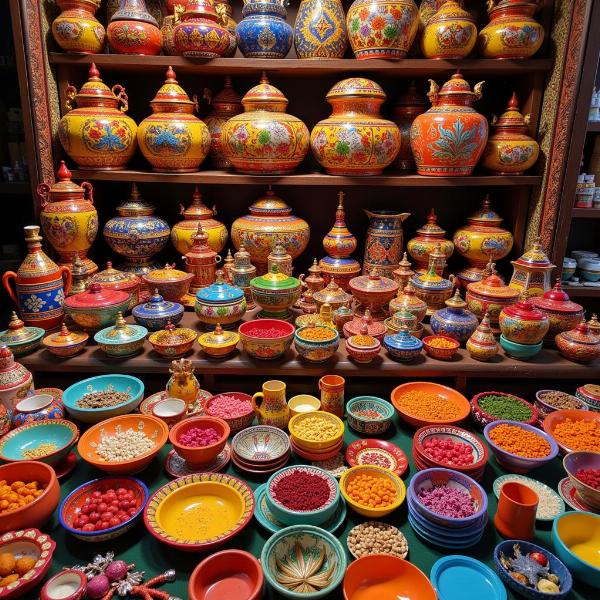The search for “samrudh meaning in Hindi” often stems from a desire to understand the nuances of prosperity and abundance in the Indian context. This article delves into the various meanings and interpretations of “samrudh,” exploring its cultural significance and providing practical examples of its usage. We will also examine related terms and concepts that enrich the understanding of this multifaceted word.
Exploring the Depths of Samrudh
“Samrudh” (समृद्ध) in Hindi primarily translates to “prosperous,” “wealthy,” “affluent,” or “abundant.” However, its meaning extends beyond mere material wealth. It encompasses a sense of well-being, completeness, and fulfillment in various aspects of life. It can describe a thriving economy, a fertile land, a rich cultural heritage, or even a person’s intellectual or spiritual growth.
Samrudh: Beyond Material Wealth
While “samrudh” can refer to financial prosperity, it often signifies a broader sense of abundance. This could include strong family ties, good health, a peaceful mind, or a fulfilling career. It reflects the holistic view of well-being prevalent in Indian culture. For instance, a “samrudh jeevan” (समृद्ध जीवन) signifies a prosperous life, encompassing not only material wealth but also emotional, social, and spiritual fulfillment.
Samrudh in Different Contexts
“Samrudh” finds its place in various contexts, enriching the language and reflecting the diverse aspects of life it represents. Let’s explore some examples:
- Samrudh desh (समृद्ध देश): A prosperous nation, signifying economic stability, social progress, and a rich cultural heritage.
- Samrudh kheti (समृद्ध खेती): A bountiful harvest, indicating fertile land and agricultural abundance.
- Samrudh sanskriti (समृद्ध संस्कृति): A rich culture, reflecting a vibrant history, traditions, and artistic expressions.
- Samrudh vyakti (समृद्ध व्यक्ति): A prosperous individual, indicating not only financial wealth but also intellectual and spiritual growth.
 Vibrant display of Indian culture
Vibrant display of Indian culture
Synonyms and Related Terms of Samrudh
Several words in Hindi share similarities with “samrudh,” each offering a slightly different nuance. Some of these include:
- Dhanwaan (धनवान): Wealthy, affluent, focusing primarily on material possessions.
- Barkatwala (बरकतवाला): Blessed, fortunate, emphasizing divine grace and abundance.
- Sampann (संपन्न): Complete, fulfilled, suggesting a state of wholeness and contentment.
- Phalafool (फलफूल): Prosperous, flourishing, often used in the context of agriculture and nature.
What does Samrudh mean spiritually?
In a spiritual context, “samrudh” can refer to a state of inner peace, wisdom, and self-realization. It signifies a life rich in meaning and purpose, beyond material pursuits.
Conclusion: Embracing the True Meaning of Samrudh
Understanding “samrudh meaning in Hindi” goes beyond a simple translation. It involves appreciating the holistic perspective of prosperity and abundance that encompasses material, emotional, social, and spiritual well-being. By embracing the multifaceted nature of “samrudh,” we can strive for a more fulfilling and meaningful life.
FAQ
- What is the opposite of “samrudh” in Hindi? The opposite of “samrudh” could be “garib” (गरीब) meaning poor, or “kangal” (कंगाल) meaning destitute, depending on the context.
- How can one achieve a “samrudh jeevan”? Achieving a “samrudh jeevan” involves a balanced approach to life, focusing not only on material success but also on personal growth, strong relationships, and spiritual development.
- Is “samrudh” only used for individuals? No, “samrudh” can be used to describe anything that exhibits abundance or prosperity, including nations, communities, families, or even nature.
- What is the significance of “samrudh” in Indian culture? “Samrudh” reflects the cultural value placed on holistic well-being, emphasizing the importance of both material and spiritual prosperity.
- Can “samrudh” be used to describe artistic expression? Yes, “samrudh” can describe a rich and vibrant artistic tradition or an individual’s artistic talent.
- Is there a difference between “dhanwaan” and “samrudh”? While both refer to wealth, “samrudh” has a broader connotation, encompassing overall well-being, while “dhanwaan” focuses primarily on material possessions.
- How is “samrudh” used in everyday conversation? “Samrudh” is often used in blessings and wishes, expressing the desire for a prosperous and fulfilling life.
Meaning-Hindi.in is your trusted partner for professional Hindi translation services. We specialize in Business & Commercial, Certified & Legal, Technical & User Manuals, Website & Localization, Educational & Academic, and Specialized translations. Our expert team ensures accurate and culturally sensitive translations to bridge the language gap and connect you with your target audience. Contact us today to discuss your translation needs! Email: [email protected], Phone: +91 11-4502-7584. Meaning-Hindi.in provides fast and reliable services to help you achieve your communication goals.